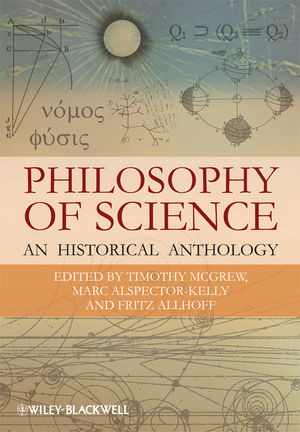|
Textbook
Philosophy of Science: An Historical AnthologyISBN: 978-1-4051-7542-5
Paperback
680 pages
May 2009, ©2009, Wiley-Blackwell
 This is a Print-on-Demand title. It will be printed specifically to fill your order. Please allow an additional 10-15 days delivery time. The book is not returnable.
Other Available Formats: Hardcover
|
||||||
Notes on Editors
Personal Acknowledgments
Text Acknowledgments
Part I
Introduction
Unit 1 The Ancient and Medieval Periods
1.1 Atoms and Empty Space: Diogenes Laertius
1.2 Letter to Herodotus: Epicurus
1.3 The Paradoxes of Motion: Zeno
1.4 Plato’s Cosmology: Plato
1.5 The Structure and Motion of the Heavenly Spheres: Aristotle
1.6 Change, Natures, and Causes: Aristotle
1.7 Scientific Inference and the Knowledge of Essential Natures: Aristotle
1.8 The Cosmos and the Shape and Size of the Earth: Aristotle
1.9 The Divisions of Nature and the Divisions of Knowledge: Aristotle
1.10 On Methods of Inference: Philodemus
1.11 The Explanatory Power of Atomism: Lucretius
1.12 The Earth: Its Size, Shape, and Immobility: Claudius Ptolemy
1.13 The Weaknesses of Hypotheses: Proclus
1.14 Projectile Motion: John Philoponus
1.15 Free Fall: John Philoponus
1.16 Against the Reality of Epicycles and Eccentrics: Moses Maimonides
1.17 Impetus and its Applications: Jean Buridan
1.18 The Possibility of a Rotating Earth: Nicole Oresme
Unit 2 The Scientific Revolution
2.1 The Nature and Grounds of the Copernican System: Georg Joachim Rheticus
2.2 The Unsigned Letter: Andreas Osiander
2.3 The Motion of the Earth: Nicholas Copernicus
2.4 The New Star: Tycho Brahe
2.5 A Man Ahead of His Time: Johannes Kepler
2.6 On Arguments about a Moving Earth: Johannes Kepler
2.7 Eight Minutes of Arc: Johannes Kepler
2.8 Tradition and Experience: Galileo Galilei
2.9 A Moving Earth Is More Probable Than the Alternative: Galileo Galilei
2.10 The Ship and the Tower: Galileo Galilei
2.11 The Copernican View Vindicated: Galileo Galilei
2.12 The "Corpuscular" Philosophy: Robert Boyle
2.13 Successful Hypotheses and High Probability: Christiaan Huygens
2.14 Inductive Methodology: Isaac Newton
2.15 Space, Time, and the Elements of Physics: Isaac Newton
2.16 Four Rules of Reasoning: Isaac Newton
2.17 General Scholium: Isaac Newton
2.18 The System of the World: Isaac Newton
Unit 3 The Modern Period
3.1 The Inductive Method: Francis Bacon
3.2 Rules for the Discovery of Scientific Truth: René Descartes
3.3 Rationalism and Scientific Method: René Descartes
3.4 Human Knowledge: Its Scope and Limits: John Locke
3.5 The Principle of Least Action: Gottfried Wilhelm Leibniz
3.6 Space, Time, and Symmetry: Gottfried Wilhelm Leibniz
3.7 The Problem of Induction: David Hume
3.8 The Nature of Cause and Effect: David Hume
3.9 The Metaphysical Foundations of Natural Science: Immanuel Kant
Unit 4 Nineteenth and Early Twentieth Century
4.1 The Nature of Scientific Explanation: Antoine Lavoisier
4.2 Determinism, Ignorance, and Probability: Pierre-Simon Laplace
4.3 Hypotheses, Data, and Crucial Experiments: John Herschel
4.4 An Empiricist Account of Scientific Discovery: John Stuart Mill
4.5 Against Pure Empiricism: William Whewell
4.6 The Causes Behind the Phenomena: William Whewell
4.7 Catastrophist Geology: Georges Cuvier
4.8 Uniformitarian Geology: Charles Lyell
4.9 The Explanatory Scope of the Evolutionary Hypothesis: Charles Darwin
4.10 Induction as a Self-Correcting Process: Charles Sanders Peirce
4.11 The Nature of Abduction: Charles Sanders Peirce
4.12 The Role of Hypotheses in Physical Theory: Henri Poincaré
4.13 Against Crucial Experiments: Pierre Duhem
4.14 On the Method of Theoretical Physics: Albert Einstein
Part II
Introduction
Unit 5 Positivism and the Received View
5.1 Theory and Observation: Rudolf Carnap
5.2 Scientific Explanation: Carl Hempel
5.3 Empiricism, Semantics, and Ontology: Rudolf Carnap
5.4 The Pragmatic Vindication of Induction: Hans Reichenbach
5.5 Dissolving the Problem of Induction: Peter Strawson
Unit 6 After the Received View: Confirmation and Observation
6.1 Empiricist Criteria of Cognitive Significance: Problems and Changes: Carl Hempel
6.2 The Raven Paradox: Carl Hempel
6.3 Two Dogmas of Empiricism: W. V. O. Quine
6.4 The New Riddle of Induction: Nelson Goodman
6.5 What Theories Are Not: Hilary Putnam
6.6 On Observation: N. R. Hanson
6.7 The Ontological Status of Theoretical Entities: Grover Maxwell
Unit 7 After the Received View: Methodology
7.1 Science: Conjectures and Refutations: Karl Popper
7.2 The Structure of Scientific Revolutions: Thomas Kuhn
7.3 Science and Pseudoscience: Imre Lakatos
Unit 8 After the Received View: Explanation
8.1 Counterexamples to the D-N and I-S Models of Explanation: Wesley Salmon
8.2 The Statistical Relevance Model of Explanation: Wesley Salmon
8.3 Why Ask, "Why"?: Wesley Salmon
8.4 Explanatory Unification: Philip Kitcher
Unit 9 After the Received View: The Realism Debate
9.1 The Current Status of Scientific Realism: Richard N. Boyd
9.2 A Confutation of Convergent Realism: Larry Laudan
9.3 Constructive Empiricism: Bas van Fraassen
9.4 The Natural Ontological Attitude: Arthur Fine



